Amid pandemic disruptions, UNFPA Haiti’s midwives urge pregnant women to continue antenatal care

PORT AU PRINCE, Haiti –
“In the past, I was really afraid because of COVID-19,” Frantzia Noël told UNFPA. She is 35 years old and 4 months pregnant, living in north-western Haiti.
Fear of the virus has discouraged many women from seeking maternal health care. Some maternity facilities have reported as much as a 25 per cent decline in patients. Health officials warn that complications of pregnancy and maternal injury or death could rise as a result.
UNFPA Haiti is working with health workers and partners to ensure safe access to maternal health services, and to encourage pregnant women to continue receiving care.
“My fear has gradually disappeared after talking to a midwife who came to my neighbourhood to show me how to adopt prevention measures before coming to the hospital,” Ms. Noël explained.
But fear is not the only threat to women’s access to health care. The spread of COVID-19 has also strained health systems, leaving many health workers unprotected and even forcing some facilities to close for decontamination.
At the Immaculée Conception Hospital of Port-de-Paix, for instance, emergency services were suspended for 27 days after one patient and two health providers tested positive for the virus.

Resumption of services
Haiti already had the highest maternal mortality rate in Latin America and Caribbean. There, 480 women die per 100,000 live births, according to UN reports. Even before the outbreak of the pandemic, skill health personnel only attended 42 percent of births.
Now, the situation could be worsening.
Haiti has seen more than 8,000 cases of COVID-19, and hundreds of deaths from the virus. Increased exposure to the disease, lack of sufficient personal protective equipment (PPE) and accumulating stress are all taking a toll on health personnel.
At Saint-Antoine Hospital of Jérémie health workers’ attendance rates declined as staff suffered burn out and anxiety. In part, this was due to lack of protective equipment.
Midwives and health workers are trying to raise awareness in the community about disease prevention measures. This helps to relieve stress among both patients and health workers.
“We organized meeting points with two or three women to respect the physical distance in their communities so they are encouraged to come to the hospital,” Christiane and Beatrice, two nurse-midwives said.

UNFPA helps Haiti fight COVID-19
UNFPA worked with the Ministry of the Status of Women and Women’s Rights to implement an action plan against COVID-19. The plan included awareness raising about the pandemic, its impact on women and girls, and how to prevent its spread.
By late July, at 19 town hall meetings, UNFPA and partners had distributed 2,300 buckets with taps to help with handwashing, 500 hygiene kits containing soap and other supplies, and dry take-home rations kits to help families cope with increased economic hardship. UNPFA also distributed thousands of face masks.
UNFPA had partnered with some 50 health-care institutions – including Immaculée Conception Hospital – to deliver medical supplies and PPE to health workers. Some 2,570 medical kits for maternity wards, 1,300 hygiene kits and 400 solar lamps were distributed. The PPE supplies include shoe-covers, bonnets, surgical masks, disposable gloves and protective glasses.
These efforts also helped health facilities in six provinces continue providing sexual and reproductive health care. This includes lifesaving maternal and prenatal health services.
“It has been with a great feeling of relief that we have welcomed the delivery of this batch of personal protection equipment,” said Dr. Saely Polycarpe, the medical director of Immaculée Conception Hospital.
This work is ongoing.
UNFPA is now working with the Central Emergency Response Fund to distribute $70,000 worth of drugs and hand-washing supplies. The agency also provides women’s safe spaces with solar lights. UNFPA Haiti is also channeling more than $100,000 of reproductive health support for pregnant women and other vulnerable populations.